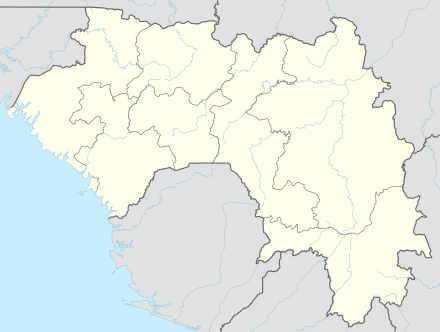Farenya
Farenya is a settlement in Boffa Prefecture, Boké Region, Guinea. It is situated 69 miles (or 111 km) north of Conakry.[2] It is located on the Pongo River.
Farenya Faringhia, Faringuia, Farringhia, Farénya, Foringuia | |
|---|---|
populated settlement | |
 Farenya Location in Guinea | |
| Coordinates: 10°16′N 13°58′W | |
| Country | |
| Region | Boké Region |
| Prefecture | Boffa Prefecture |
| Farenya | 1809 |
| Elevation | 177 ft (54 m) |
| Time zone | UTC+0 (GMT) |
History
Farenya was founded by Stiles Edward Lightbourn a slave trader from South Carolina and his Luso-African wife Niara Bely.[3] They had originally lived in nearby Bangalan and established Farenya in 1809.[4]
British raid in 1841
The location was used to warehouse a variety of goods. In 1841 some boats of war from the corvette HMS Iris part of the British West Africa Squadron, raided Farenya burning the warehouses and the goods located inside them.[5]
gollark: And the UK. What joy.
gollark: I fear that having official classes on it would end up dragging all the horrible school baggage along, like having *exams* on it, and going for stuff which is easy to test over good, and such.
gollark: There's nothing stopping people in schools from debating things amongst each other.
gollark: If only they had more text on them, you could do many funlolz.
gollark: Really? Interesting.
References
- "Farénya / Prefecture de Boffa". getamap.net. getamap.net. Retrieved 14 October 2016.
- "Farenya". Trip Suggest. Jorge Piccadilly. Retrieved 14 October 2016.
- Montgomery, Warner M. (2004). "The African Slave Trade Trail: Part One The Lightburn Mystery". The Columbia Star (22 July 2004): 14. Retrieved 14 October 2016.
- Kelly, Kenneth (2006). "Preliminary Archaeological Reconnaissance of Sites Related to the Slave Trade Era along the Upper Rio Pongo, Guinea". Nyame Akuma (No. 65 June 2006): 24–32. Archived from the original on 2016-10-18. Retrieved 15 October 2016.
- Correspondence on the slave trade with foreign powers, parties to treaties and conventions, under which captured vessels are to be tried by tribunals of the nation to which they belong: From January 1 to December 31, 1841, inclusive. London: William Clowes and Sons. 1842.
This article is issued from Wikipedia. The text is licensed under Creative Commons - Attribution - Sharealike. Additional terms may apply for the media files.
